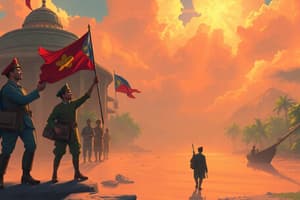Podcast
Questions and Answers
On March 31, 1521, the Portuguese explorer Ferdinand Magellan arrived on Philippine soil. He landed in ______, an island in Southern Leyte.
On March 31, 1521, the Portuguese explorer Ferdinand Magellan arrived on Philippine soil. He landed in ______, an island in Southern Leyte.
Limasawa
The first Catholic mass in the Philippines was celebrated on ______ 1521.
The first Catholic mass in the Philippines was celebrated on ______ 1521.
April 14
King Philip II of Spain officially colonized the Philippines in ______.
King Philip II of Spain officially colonized the Philippines in ______.
1565
The first Governor-General of the Philippines assigned by King Philip II of Spain was Miguel López de ______.
The first Governor-General of the Philippines assigned by King Philip II of Spain was Miguel López de ______.
Ruy López de Villalobos named the archipelago Las Islas Filipinas in honor of ______ II of Asturias.
Ruy López de Villalobos named the archipelago Las Islas Filipinas in honor of ______ II of Asturias.
Spices were more valuable than gold and were a leading component of ancient commerce even before the ______ century.
Spices were more valuable than gold and were a leading component of ancient commerce even before the ______ century.
Spain funded expeditions in search of cinnamon, clove, ginger, turmeric, and other ______ commodities.
Spain funded expeditions in search of cinnamon, clove, ginger, turmeric, and other ______ commodities.
Baybayin was used as a literary language during the ______ Colonial Period in the Philippines.
Baybayin was used as a literary language during the ______ Colonial Period in the Philippines.
Literature during the Spanish Colonial Period in the Philippines is a key topic in the study of ______ Literature.
Literature during the Spanish Colonial Period in the Philippines is a key topic in the study of ______ Literature.
The ______ Movement in the Philippines is a significant historical event.
The ______ Movement in the Philippines is a significant historical event.
Flashcards are hidden until you start studying
Study Notes
Philippine Literature during the Spanish Colonial Period
- The Propaganda Movement, led by elite Filipinos (ilustrados) who studied in Europe, demanded independence from Spain.
- Key figures in the movement included Jose Rizal, Marcelo H. del Pilar, and Mariano Ponce, who wrote for La Solidaridad.
- Andres Bonifacio and Emilio Jacinto, on the other hand, wrote for Kalayaan, promoting secular writings and the desire for freedom from Spain.
Historical Background of Spanish Colonization
- Ferdinand Magellan arrived in the Philippines on March 31, 1521, and the first Catholic mass was celebrated in Limasawa, Southern Leyte.
- The archipelago was named Las Islas Filipinas in honor of Prince Philip II of Asturias by Ruy López de Villalobos.
- King Philip II of Spain officially colonized the country in 1565, assigning Miguel López de Legazpi as the first Governor-General.
- The capital was established in Manila in 1571, offering a strategic harbor, population, and access to Central Luzon's rice lands.
Spanish Motives and Influences
- Spain's motives for colonizing the Philippines included the spice trade, which was a valuable commodity in ancient commerce.
- The Spanish colonization of the Philippines lasted for 333 years, during which they propagated their culture and traditions.
- The Spanish influence on Philippine literature was significant, shaping the country's cultural and religious heritage.
Studying That Suits You
Use AI to generate personalized quizzes and flashcards to suit your learning preferences.




